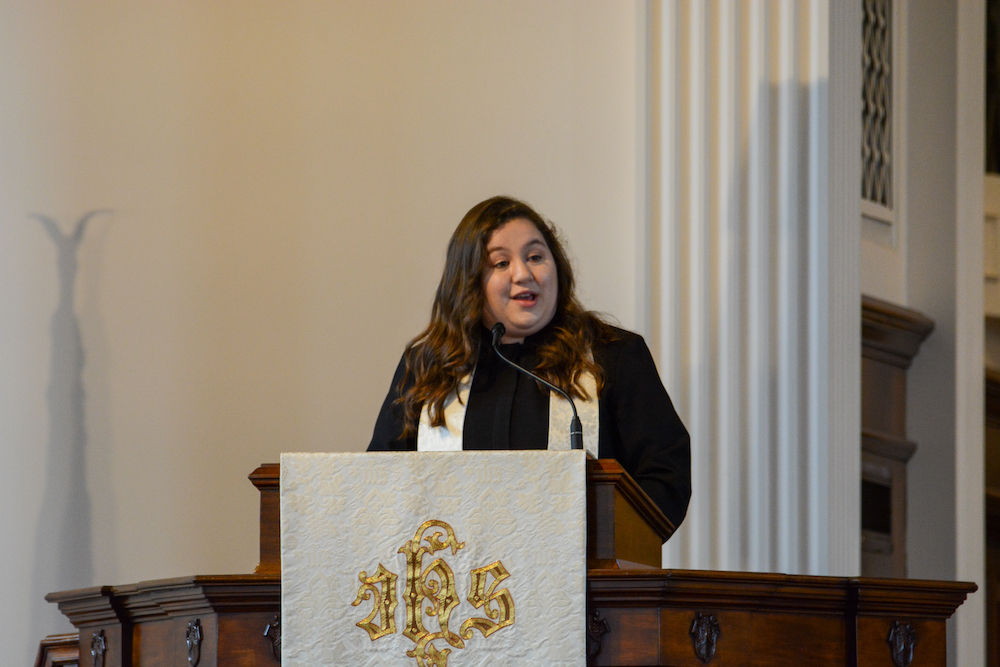Youth Sunday Sermon by Lindsey Stevens
Good morning, everyone. I am glad you could be here today.
During my freshman year of high school, my grandmother was diagnosed with Hodgkin’s Lymphoma in her superior vena cava, a major vein that carries blood from the upper body to the heart. Thankfully, after chemotherapy and radiation, she made a full recovery and is doing wonderfully.
At the time, though, her illness made me angry. She had done nothing to deserve the pain she was suffering. I was particularly upset with God. I could not understand how Hhe could inflict this kind of damage on someone he was supposed to care about. In the end, another member of this church helped me work through these feelings. God’s plan, he reminded me, extended beyond the concerns of this world. My anger was mine alone. It emanated from my own mortal fears and inadequacies. And while Michael Kellett is not in attendance today, I suspect he understands how much I appreciated his guidance.
Everyone experiences events that change their lives for the worse. A beloved pet passes away. A job opportunity is lost. A family member is diagnosed with an illness. For those who have weathered these events without having your faith shaken, I commend you.
In the New Testament lesson today, we come across this horribly mean and angry person named Saul. When Saul is on his way to persecute disciples in Damascus, Jesus rains down on him in the form of a bright, blinding light. For three days, Saul is in the dark. Then finally God sends Ananias, a guide, to help Saul through his recovery and remove the “scales” from his eyes. As most of us know, after this transformation, Saul becomes Paul and goes on to spread God’s word to many groups of people. While I hope I am not as bad as Saul, I can relate to him. Too often, I am blind to the goodness around me. Sometimes I need friends, like Michael Kellett and others at River Road, to serve as my Ananias. They remind me of God’s work in this world and beyond. They help me to find my inner Paul and continue along the road in service to God’s greater message.
That service is not just theoretical. As my grandmother’s condition improved, I became more and more impressed with the work of the doctors and nurses who had saved her. I came to see Oncology as one of those roads that God might inspire a person to walk. After some research, I applied for an internship and, this year, spent three days a week after school making rounds with doctors at the Sarah Cannon Cancer Institute, the same network that had served my grandmother. I helped conduct patient interviews and examinations. The doctors trained me to recognize various types of cancer cells under the microscope. Sometimes I even offered diagnoses. On one of my last days at the office, I surprised my mentor by volunteering that one of his patients could not take chemotherapy because her white blood cell count was too low. He reviewed the patient’s chart and told the nurse I had made the correct assessment. This internship cemented my plan to study Biology when I enter the University of Richmond next year, with the eventual goal of attending medical school.
I realize there is something of a contradiction here. God is more concerned with our spiritual lives than our physical ones, so maybe Oncology is not Paul’s road after all. In response, I can say only that there were days when the doctors with whom I worked were more than mechanics for the human body. Often they had to deliver the worst news that a patient had ever heard. They had to provide hope even in the most dire circumstances. Some days, they survived on caffeine and adrenaline and the simple faith that they were doing good in the world. My time with them shaped me into a different person. As with Saul and Ananias, it inspired me onto a new—if difficult—path.
God does not always come in a bright light. The inspiration he offers is not always sudden. Sometimes he makes his presence known through the people who surround us on a daily basis, in good times and bad. In this way, our mortal and spiritual lives meet. We follow God by recognizing what is best in each other. We follow God by using trials to set us on a better path. We follow God by becoming guides for others, embodying his love in our words and actions.
That should be the end of my sermon, but I could not leave today without saying thank you to this church. There are so many people here who have impacted my life and led me to where I am today. So whether you were my Moses or my Paul, my Ananias or my Isaac, or simply a fellow guest at the table, I am truly grateful. I will never get another chance to make this statement in exactly this way, so thank you, church, for being my guide and friend these last 14 years. I have enjoyed growing up here and being part of this wonderful congregation. And thanks especially to the youth group, for giving me a loving place of refuge. I will always cherish our time together: our morning walks, our 2am adventures, our constant hugs. I cannot wait for the spectacular things you will do in the future.
Amen.

